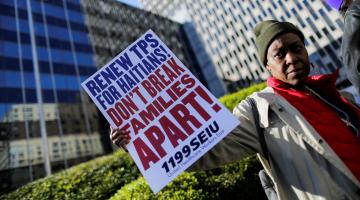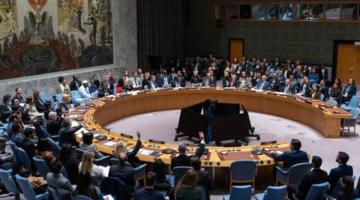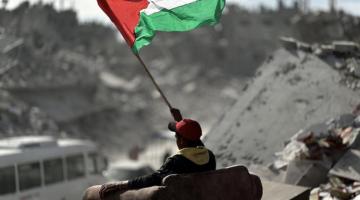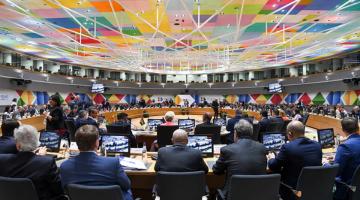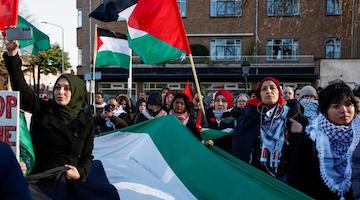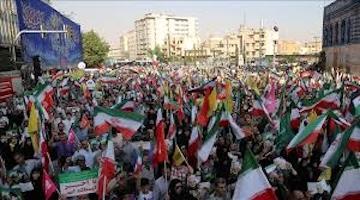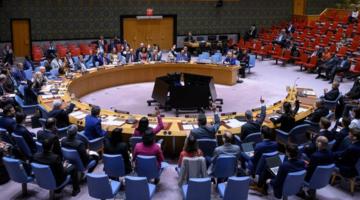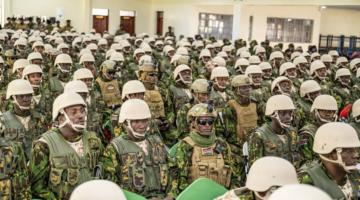A reminder that Haiti’s struggle is an anti-colonial one that deserves the world’s solidarity, not its indifference.
On September 30, 2024, the United Nations Security Council (UNSC) unanimously passed yet another mandate to continue the ongoing occupation of Haiti. This time, it was a resolution to re-authorize the deployment of the Multinational Security Support Mission (MSS) for another year. The MSS, which was first authorized in October 2023, called for the deployment of foreign military and police into Haiti. But the MSS is unusual in that it is a UN-sanctioned mission, but not a UN mission in the same sense as a UN peacekeeping mission. Why? The US failed in its attempts to use the UN as its proxy to militarily occupy Haiti – as it did in 2004 with the help of its minions, France and Canada. Russia and China refused to sign off on a UN peacekeeping mission, forcing the US to resort to an alternative model for its occupation: convince Kenyan and Caribbean puppet states to provide police and soldiers in a “Blackface” cover for its imperialist designs in Haiti. What is also important to note about the MSS is that the US and other states had to fund it themselves - hence the reason why the US paid Kenyan stooge-president William Ruto $600 million dollars for 2000 troops.
Almost a year later, there are only around 380 Kenyan police in Haiti – and they arrived in early June 2024. If you speak to Haitians on the ground, you will know that the Kenyans have done little since arriving in Haiti. Sure, they go on soft patrols with the Haitian police, but their presence has not helped deal with the main reason behind their deployment: to fight “gangs.” Nevertheless, the UNSC extended the mission’s mandate and, for the next 12 months, Haiti will have more foreign mercenaries stationed in the country under the guise of “fighting gangs.” Meanwhile, the US will pretend to be building infrastructure to house the mercenaries, as it will really be building instead its own military base in Port-au-Prince.
What is most shocking about the renewal of this ill-defined mission, the MSS – the effective foreign invasion and occupation of a sovereign nation by the US and its proxies – is both the active participation of the 15 members of the UNSC and the silence of the US and world “left” on the US occupation of Haiti. At the same time, Haiti’s treatment at the hands of the international community is criminally exceptional – and exceptionally racist. Why, for instance, is Haiti suffering under a full foreign military invasion and occupation for “gang” violence when: 1) it is the only country not at war to beinvaded and occupied; and 2) the genocide in Gaza is being livestreamed while the the zionist entity is on a murderous rampage in Lebanon?
Perhaps one of the reasons for the lack of attention to Haiti’s predicament is the world’s refusal to acknowledge that the country is under occupation – and that it has been under occupation since 2004. It is the only reason why there is a series of foreign entities in Haiti – BINUH (the UN office) and Core Group – non-Haitians that control the country’s political apparatus. It is also why the US was able to destroy the entire Haitian state and install, against the Haitian constitution, a complete puppet government to achieve its goals in the country and throughout the region. It is only this “forgotten occupation” that can explain Haiti’s predicament.
In 2008, four years after the occupation began –the one that continues to this day – the UNSC also voted unanimously to extend the United Nations Stabilization Mission (MINUSTAH) in Haiti. Writing in the Socialist Worker at this time, journalist Emmanuel Santos denounced the collusion of the UN, the US, and countries of the region in working to deny Haiti sovereignty. Santos demonstrated how countries like Brazil, Argentina, Chile, Uruguay, Colombia, and even Bolivia, worked to maintain the occupation of Haiti.
Reading Santos’s account of the MINUSTAH occupation of Haiti, one sees not only how the occupation of Haiti continues, but also how the model that enables its continuation replicates itself. There have been numerous UN mandates and extensions of mandates to continue the US and world occupation of Haiti that began in 2004. And every time, the same racist discourse about Haitian incompetence and violence is deployed– with “gangs” being the master trope of Haiti’s supposedly violent political predicament.
But Santos does something that almost none of today’s commentators, the supposed “experts” of Haiti, do: he does not exceptionalize Haiti and he places the US occupation in the context of US imperial policies. The point of the occupation, Santos reminds us, is to completely destroy the Haitian mass leftist movement that arose after the end of the Duvalier dictatorship. In effect, the US-led 2004 coup in Haiti and the subsequent military occupation, “legitimized the Bush administration’s ‘regime change’ doctrine in the region,” one that would eventually be used on Venezuela, Bolivia, and other places. To have solidarity with Haiti, therefore, is to understand Haiti within the context of US imperial machinations. Santos understood this. “Solidarity with the Haitian people,” he argued, “should be part of a broader anti-imperialism that calls for an end to the wars in Afghanistan, Iraq and Palestine as well as an immediate withdrawal of the UN from Haiti and elsewhere.”
We reprint Emmanuel Santo’s article below. Let it be a reminder that Haiti’s struggle is an anti-colonial one that deserves the world’s solidarity, not its indifference.
The Forgotten Occupation
Emmanuel Santos
More than 9,000 military and civilian personnel from the United Nations Stabilization Mission in Haiti (MINUSTAH, by its French initials) will remain in the country until October 2009, following the UN Security Council's unanimous vote on October 15 to extend its mandate.
MINUSTAH troops have occupied Haiti since 2004 when a U.S.-backed coup overthrew democratically elected President Jean-Bertrand Aristide. The brutal Brazilian-led UN military occupation has resulted in the death, imprisonment or disappearance of thousands of Aristide supporters. Human rights organizations and the independent media have reported sexual assaults committed against women and children.
Brazilian leaders hope that their country's role in the occupation will lead to a future seat in the UN Security Council, where it can play a bigger political role as the region's emerging power. Other South American countries that help maintain the occupation in Haiti include Argentina, Chile, Uruguay and Colombia.
On October 31, Bolivia sent a contingent of 200 troops. Israel, the main U.S. ally in the Middle East, has played a role in maintaining the occupation by flying in Jordanian troops. The U.S. also has military and civilian personnel on the ground.
The vote to extend the UN mandate came after warnings from the top UN envoy in Haiti, Hedi Annabi, who, according to Reuters, said that ignoring the plight of the Caribbean country and leaving its population hungry and angry could lead to a new wave of social unrest--an allusion to popular protests over rising food prices in April that ousted former Prime Minister Jacques-Édouard Alexis.
But UN concerns about political stability in Haiti are only a justification for the ongoing presence of a 9,000-strong “peacekeeping” military force that keeps the popular movement in check by targeting left-wing activists and criminalizing the poor. In fact, Brazilian military forces are carrying out counterinsurgency operations in Haiti similar to those used in Brazil to repress the poor in the favelas and activists from the Landless Peasants Movement.
MINUSTAH troops conduct raids in the poorest neighborhoods under the pretext of disarming criminal gangs. But those so-called "gangs" are ordinary Haitians who are being punished by the U.S. and its allies for daring to oppose the occupation. Thus, disarming criminal gangs serves to justify UN military presence there. Already, several massacres have been committed since its arrival.
Meanwhile, the Bush administration and its allies continue to spread anti-Aristide propaganda to deflect criticism by human rights organizations that accuse MINUSTAH of systematic human rights violations. Even Haitian-American singer Wyclef Jean justifies the UN occupation by propagating the idea that it is fighting against dangerous gangs.
In 2004, Jean supported the coup against Aristide. Jean was also executive producer of Ghost of Cité Soleil, a propaganda film that portrays Aristide supporters as ruthless gangsters. Jean's role in demonizing Aristide and his supporters legitimized the UN occupation in the eyes of some Hollywood progressives and others.
But local and international NGOs also played a role in legitimizing the occupation on the grounds that it would bring order by disarming street gangs--in particular, Canadian NGOs, which led the charge against Aristide in the days leading to the February 2004 coup that ousted him.
Canada's involvement in Haiti is part of a commitment to serve U.S. interests, just as it has in Iraq and Afghanistan.
***
A combative grassroots movement exploded in April changing the political landscape in Haiti and weakening both President René Préval and his Lespwa (Hope) Party. Préval's coalition was suffering, as some of the 22 National Assembly members from Lespwa joined Concertation des Parlementaires Progressistes (CPP, Coalition of Progressive Parliamentarians), a new legislative bloc that rejects neoliberal policies.
After the senate rejected two of Préval's candidates for prime minister, the government was paralyzed for four months. The impasse ended in July, when the senate confirmed Michèle Pierre-Louis as prime minister. Pierre-Louis is the founder of FOKAL, an NGO funded by financial speculator George Soros.
But the confirmation of Pierre-Louis didn't represent a departure from politics as usual in Haiti.
In November, Pierre-Louis was criticized by Haitian labor activists after she made a visit to the Dominican Republic to attend a small economic summit, but didn't extend her visit to meet with Haitian immigrants after several immigrants were killed in a wave of racist attacks the month before.
Furthermore, discontent is mounting against the UN occupation and the Préval/ Pierre-Louis government for failing to deliver on any of its 2006 election campaign promises.
To mark the four-year anniversary of the UN occupation, protests were held in several countries on the eve of Brazilian President Luis Inácio Lula da Silva's visit to Haiti on May 28. Solidarity activists in Brazil, Mexico and the U.S. marched to demand the immediate withdrawal of MINUSTAH from Haiti. The biggest demonstrations took place in Brazil, where labor and left-wing activists marched in several cities.
The occupation of Haiti is unpopular among Brazilians. Over the past four years, Brazil has spent more than 464 million Reals ($290 million) on the occupation, a major sum for a country where more than 40 million people live below the poverty line.
Meanwhile, the movement against the high cost of living continues in Haiti. On August 25, several hundred people gathered in La Savane, a poor area in the town of Les Cayes, to demand lower food and gas prices. A rapid response by MINUSTAH forces and Haitian police dispersed the crowd with tear gas.
On October 14, several hundred people gathered in front of the Commerce and Industry Ministry to protest the high cost of living and call for an end to the MINUSTAH occupation. The protest was organized by Soleil in Action Coalition, known as Aba Satan (Down with Satan)--a key player in the events leading to the April rebellion. It plans similar actions in the future.
Meanwhile, Lavalas activists and supporters are holding weekly vigils for activists who have been jailed and disappeared since the February coup.
During Lula's visit, Haitian police from the elite CIMO unit brutally dispersed a vigil of protesters demanding a prompt investigation into the disappearance of human rights activist Lovinsky Pierre-Antoine. Pierre-Antoine disappeared in 2007 after attending a meeting with human rights activists from Canada and the U.S.
Haitian activists, along with international supporters, have in the past organized successful campaigns to free human rights activists, Lavalas leaders and former Aristide collaborators. In July 2006, former Prime Minister Yvon Neptune was released after spending two years in jail. In August 2006, Annette Auguste, a folk singer and activist popularly known as So Anne, was also released.
Presently, a local and international campaign is underway to free Ronald Dauphin, an Aristide supporter arrested by right-wing paramilitaries during the 2004 coup. Five years later, he has yet to be convicted for any crime.
***
Despite repression carried out by MINUSTAH, Haitian National Police and right- wing death squads since 2004, ordinary people continue the fight to return the democratically elected president from his forced exile in South Africa.
While it's true that Aristide implemented neoliberal policies, he remains popular among the majority of Haitians. Four years after the coup, Fanmi Lavalas (FL or Lavalas), the center-left populist party founded by Aristide 12 years ago, is still a mass political organization. Although it is split into two different wings internally, its grassroots supporters are united in confronting the UN occupation by organizing nationwide demonstrations.
This is a testament to the determination of ordinary Haitians, who also face one of the worst humanitarian catastrophes on the planet after four hurricanes struck the country in less than two months. Soon after, the agricultural sector collapsed, depriving workers and peasants of one of their main sources of income in a country where the unemployment rate is 80 percent.
But the destructive effects of nature could have been avoided had there been more investment on infrastructure, health care and food subsidies. Haiti is more vulnerable today because the occupation has rolled back many of its democratic freedoms. During the coup, schools and hospitals were destroyed by right-wing paramilitaries, as they entered the country from neighboring Dominican Republic, where they received training and arms from the Dominican government and the U.S.
The government's response to the crisis hasn't been enough--largely due to Haiti's dependence on outside powers. In the agriculture department, for instance, some 800 NGOs control part of the budget, undermining the state's ability to deal with the crisis.
And even though Haiti is facing a crisis of indescribable proportions, it hasn't stopped paying back its foreign debt. As of this writing, Haiti's payments amount to $1 million a week. Activists worldwide are pressing the World Bank to forgive Haiti's $1.7 billion foreign debt, but so far, it has refused.
***
Prior to the recent devastation, independent journalists revealed a plan to demolish Cité Soleil, a poor neighborhood in Port-au-Prince, to extend the UN military base. The U.S. is funding the base extension. Haiti Liberté reporter Kim Ives explains the importance of this military base for the U.S.:
First, as Port-au-Prince's largest, poorest and most pro-Aristide slum, it has been a hotbed of anti-occupation resistance for the past four years. Although most of the popular organizations carrying out armed struggle were dismantled in early 2007, unrest still continues there, particularly with Haiti's (and the capitalist world's) worsening economic crisis. Hence, military domination of this important northern flank of Haiti's capital is critical.
As in the past, the military occupation of Haiti is part of a larger plan to keep the region under U.S. dominion. Haiti shares the Windward Passage with Cuba, a strait that has great importance for the U.S., and the island of Hispaniola with the Dominican Republic.
In the early 1990s, Haiti's election of Aristide under a populist platform gave hope to millions of people at a time when most governments in the region were implementing neoliberal policies. A series of U.S.-backed regimes and interventions to derail the movement for change followed.
The 2004 coup against Aristide and the subsequent military occupation legitimized the Bush administration's "regime change" doctrine in the region, making Venezuela and Bolivia future targets of U.S. intervention.
Solidarity with the Haitian people should be part of a broader anti-imperialism that calls for an end to the wars in Afghanistan, Iraq and Palestine as well as an immediate withdrawal of the UN from Haiti and elsewhere.
At the same time, activists must point out Aristide's role in accepting neoliberal policies that impoverished the poor, while supporting ordinary people's struggles to return him to complete his term. Demanding immediate cancellation of Haiti's foreign debt is also important, because it could free up needed resources to feed people.
In the long term, however, it will take the unity of workers and peasants in the entire region to free Haiti from the yoke of foreign intervention and exploitation.
Emmanuel Santos, “The forgotten occupation,” Socialist Worker, December 12, 2008.

